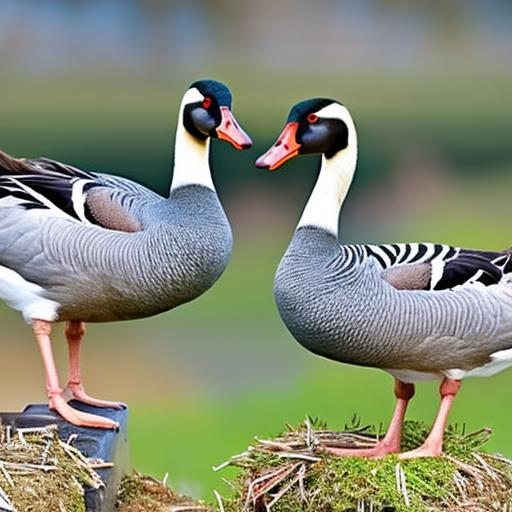The commercial geese industry is a significant sector within the broader poultry farming industry. Geese farming involves the rearing and breeding of geese for their meat, eggs, and feathers. Geese are known for their high-quality meat, which is lean, flavorful, and in high demand in many parts of the world. Additionally, geese eggs are also sought after for their rich flavor and nutritional value. The feathers of geese are used in various industries, including the production of down-filled bedding and clothing. The commercial geese industry is a global one, with significant production taking place in countries such as China, Hungary, Poland, and France. In recent years, there has been a growing interest in geese farming in other parts of the world, driven by the increasing demand for high-quality, organic, and locally sourced poultry products.
Geese farming can be a profitable venture for farmers who have the knowledge, resources, and dedication to succeed in this industry. However, like any other agricultural enterprise, geese farming comes with its own set of challenges and considerations. Factors such as breed selection, breeding and rearing practices, market trends, and cost management all play a crucial role in determining the profitability of a commercial geese farm. In this article, we will explore the various aspects of the commercial geese industry and provide insights into how farmers can maximize their profits in this sector.
Factors Affecting Profitability in Geese Farming
Several factors can impact the profitability of a commercial geese farm. One of the most critical factors is the selection of the right breed for the farm’s specific goals and market demands. Different geese breeds have varying growth rates, meat quality, and egg production capabilities. Farmers must carefully consider these factors when choosing the breeds to raise on their farms. Additionally, the availability of suitable breeding stock and the genetic diversity of the chosen breed are also essential considerations. Another crucial factor affecting profitability is the efficiency of the breeding and rearing practices employed on the farm. Proper nutrition, housing, and healthcare are essential for ensuring the health and productivity of the geese flock. Farmers must also consider market trends and consumer demand when planning their production and marketing strategies. Understanding the preferences of the target market and adapting production practices to meet those preferences can significantly impact the farm’s profitability. Finally, cost management and efficient resource utilization are critical for maximizing profits in geese farming. Farmers must carefully monitor and control expenses related to feed, labor, and infrastructure to ensure that the farm operates at optimal efficiency.
Top 5 Most Profitable Commercial Geese Breeds
When it comes to commercial geese farming, breed selection plays a crucial role in determining the profitability of the farm. Different geese breeds have varying characteristics that make them suitable for specific production goals and market demands. The following are the top five most profitable commercial geese breeds:
1. Toulouse Geese: Toulouse geese are known for their large size and excellent meat quality. They are a popular choice for commercial meat production due to their rapid growth and high meat yield. Toulouse geese are also valued for their calm temperament, making them easy to handle and manage on the farm.
2. Embden Geese: Embden geese are another popular choice for commercial meat production. They are known for their fast growth, high feed conversion efficiency, and large breast muscles, which are highly prized in the market. Embden geese are also known for their white feathers, which are used in the production of down-filled bedding and clothing.
3. Chinese Geese: Chinese geese are a dual-purpose breed valued for both meat and egg production. They are known for their excellent egg-laying capabilities, with some individuals laying up to 80-100 eggs per year. Chinese geese are also valued for their lean and flavorful meat, making them a profitable choice for farmers looking to diversify their product offerings.
4. Pilgrim Geese: Pilgrim geese are a unique breed known for their auto-sexing capabilities, meaning that male and female goslings can be easily distinguished by their feather color at hatching. This characteristic makes Pilgrim geese popular for commercial egg production, as it allows farmers to selectively breed for egg-laying capabilities. Pilgrim geese are also valued for their calm temperament and excellent meat quality.
5. African Geese: African geese are a large and hardy breed known for their excellent meat quality and egg-laying capabilities. They are well-suited to free-range production systems and are valued for their ability to forage and thrive in various environmental conditions. African geese are also known for their strong maternal instincts, making them suitable for natural incubation and rearing of goslings.
Breeding and Rearing Practices for Maximizing Profits
In commercial geese farming, breeding and rearing practices play a crucial role in determining the productivity and profitability of the farm. Proper breeding practices are essential for maintaining the genetic diversity and health of the geese flock. Farmers must carefully select breeding stock based on desired traits such as growth rate, meat quality, egg-laying capabilities, and temperament. It is also important to avoid inbreeding and maintain genetic diversity within the flock to prevent the accumulation of undesirable traits. Additionally, farmers may choose to implement selective breeding programs to improve specific traits in their geese flock, such as egg production, meat yield, or disease resistance.
Rearing practices also play a significant role in maximizing profits in geese farming. Proper nutrition is essential for ensuring the health and productivity of the geese flock. Farmers must provide a balanced diet that meets the nutritional requirements of the geese at different stages of growth and production. Adequate housing and environmental management are also crucial for the well-being of the geese flock. Proper ventilation, temperature control, and sanitation are essential for preventing disease outbreaks and ensuring the overall health of the geese. Additionally, farmers must implement effective healthcare and parasite control programs to prevent and manage common health issues in geese. By implementing sound breeding and rearing practices, farmers can maximize the productivity and profitability of their geese farm.
Market Trends and Demand for Commercial Geese Products
Understanding market trends and consumer demand is essential for the success of a commercial geese farm. The demand for geese products, including meat, eggs, and feathers, is influenced by various factors such as consumer preferences, dietary trends, and cultural traditions. In recent years, there has been a growing interest in high-quality, organic, and locally sourced poultry products, including geese meat and eggs. Consumers are increasingly seeking out products that are raised in a sustainable and ethical manner, which presents an opportunity for commercial geese farmers to capitalize on this trend.
Geese meat is highly prized for its lean, flavorful, and nutritious qualities, making it a popular choice for consumers looking for alternative protein sources. Additionally, geese eggs are valued for their rich flavor and nutritional value, making them a sought-after product in the market. The feathers of geese are used in various industries, including the production of down-filled bedding and clothing, which further contributes to the demand for geese products. By staying informed about market trends and consumer preferences, commercial geese farmers can tailor their production and marketing strategies to meet the demands of the market and maximize their profitability.
Cost Management and Efficient Resource Utilization
Cost management and efficient resource utilization are critical for maximizing profits in commercial geese farming. Farmers must carefully monitor and control expenses related to feed, labor, infrastructure, and healthcare to ensure that the farm operates at optimal efficiency. One of the most significant expenses in geese farming is feed, which accounts for a significant portion of the production costs. Farmers must carefully manage their feed supply, ensuring that it meets the nutritional requirements of the geese while minimizing waste and inefficiencies. Additionally, farmers may explore alternative feed sources, such as pasture, forage, and by-products, to reduce feed costs and improve the sustainability of their operations.
Labor is another significant expense in geese farming, and farmers must carefully manage their workforce to ensure that tasks are completed efficiently and cost-effectively. Proper infrastructure and equipment are essential for the efficient operation of a geese farm. Farmers must invest in suitable housing, fencing, and equipment to ensure the health and productivity of the geese flock while minimizing maintenance and repair costs. Healthcare and parasite control are also essential for preventing disease outbreaks and ensuring the overall health of the geese. By implementing cost-effective management practices and efficiently utilizing resources, commercial geese farmers can maximize their profits and ensure the long-term sustainability of their operations.
Creating Value-Added Products from Geese
Creating value-added products from geese can be a profitable strategy for commercial geese farmers. In addition to selling whole geese meat and eggs, farmers can explore various value-added products that cater to different market segments and consumer preferences. One popular value-added product is processed geese meat, such as sausages, smoked meat, and pâté. Processed geese meat products offer convenience and versatility to consumers and can command higher prices in the market. Additionally, farmers can explore the production of specialty products such as foie gras, a delicacy made from the liver of fattened geese. Foie gras is a high-value product that is in demand in gourmet and fine dining establishments, presenting an opportunity for farmers to tap into this niche market.
Another value-added product from geese is down-filled bedding and clothing. The feathers of geese are highly prized for their insulating properties and are used in the production of high-quality bedding, pillows, and clothing. By partnering with textile manufacturers or establishing their own processing facilities, farmers can add value to their geese products and access new markets. Additionally, farmers can explore the production of specialty eggs, such as organic or free-range geese eggs, which cater to consumers seeking high-quality and ethically produced food products. By creating value-added products from geese, farmers can diversify their product offerings, capture new market segments, and increase their profitability.
Implementing Sustainable and Eco-Friendly Practices
Implementing sustainable and eco-friendly practices is essential for the long-term success and viability of commercial geese farming. Sustainable practices aim to minimize the environmental impact of farming operations, conserve natural resources, and promote the well-being of the geese and the surrounding ecosystem. One key aspect of sustainable geese farming is the responsible management of natural resources, such as water and land. Farmers must implement efficient water management practices, such as rainwater harvesting, irrigation optimization, and water recycling, to minimize water usage and reduce the farm’s environmental footprint.
Additionally, farmers can implement rotational grazing and pasture management practices to optimize land use and promote soil health. By allowing geese to forage on pasture, farmers can reduce the reliance on conventional feed sources, improve the nutritional quality of the geese products, and enhance the environmental sustainability of their operations. Sustainable geese farming also involves the responsible use of inputs, such as feed, fertilizers, and pesticides. Farmers can explore organic and regenerative farming practices to minimize the use of synthetic inputs and promote the health and resilience of the geese flock and the surrounding ecosystem. By implementing sustainable and eco-friendly practices, commercial geese farmers can reduce their environmental impact, improve the quality of their products, and meet the growing demand for ethically produced poultry products.
Leveraging Technology for Increased Efficiency
Leveraging technology is essential for increasing the efficiency and productivity of commercial geese farming. Advancements in agricultural technology offer farmers various tools and solutions for optimizing their operations, improving the health and well-being of the geese, and maximizing their profitability. One area where technology can make a significant impact is in the monitoring and management of the geese flock. Farmers can utilize digital monitoring systems, such as sensors and cameras, to track the health, behavior, and productivity of the geese in real-time. This data can provide valuable insights into the performance of the flock, allowing farmers to make informed decisions and adjustments to their management practices.
Another area where technology can benefit commercial geese farming is in feed management and nutrition. Automated feeding systems can accurately dispense feed to the geese based on their nutritional requirements, reducing waste and ensuring that the flock receives the necessary nutrients for optimal growth and productivity. Additionally, farmers can utilize precision farming technologies, such as GPS and drones, to optimize land use, monitor pasture health, and implement targeted grazing practices. By leveraging technology, commercial geese farmers can increase the efficiency of their operations, improve the health and productivity of the geese flock, and stay competitive in the market.
Tips for Successful Marketing and Sales of Commercial Geese Products
Successful marketing and sales are essential for the profitability and sustainability of a commercial geese farm. Farmers must develop effective marketing strategies to promote their products, reach their target market, and differentiate themselves from competitors. One key aspect of successful marketing is understanding the preferences and needs of the target market. Farmers must conduct market research to identify consumer trends, preferences, and purchasing behaviors related to geese products. By understanding the market, farmers can tailor their product offerings, pricing, and promotional activities to meet the demands of the target market and maximize their sales.
Another important aspect of successful marketing is building a strong brand and reputation for the farm and its products. Farmers can differentiate their products by highlighting their unique selling points, such as organic production practices, high-quality standards, and ethical treatment of the geese. By building a strong brand, farmers can create a loyal customer base and command premium prices for their products. Additionally, farmers can explore various sales channels, such as direct-to-consumer sales, farmers’ markets, online platforms, and partnerships with retailers and restaurants, to reach a broader audience and increase their sales.
Effective communication and customer engagement are also essential for successful marketing and sales. Farmers can utilize social media, websites, and other digital platforms to connect with consumers, share their farm’s story, and educate the public about the benefits of geese products. By engaging with consumers and building relationships, farmers can create a loyal customer base and generate repeat sales. By implementing effective marketing and sales strategies, commercial geese farmers can increase the visibility and demand for their products, maximize their profitability, and contribute to the long-term success of their operations.
Meet Walter, the feathered-friend fanatic of Florida! Nestled in the sunshine state, Walter struts through life with his feathered companions, clucking his way to happiness. With a coop that’s fancier than a five-star hotel, he’s the Don Juan of the chicken world. When he’s not teaching his hens to do the cha-cha, you’ll find him in a heated debate with his prized rooster, Sir Clucks-a-Lot. Walter’s poultry passion is no yolk; he’s the sunny-side-up guy you never knew you needed in your flock of friends!







